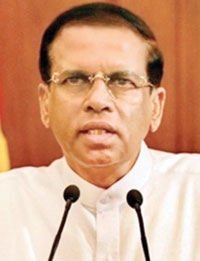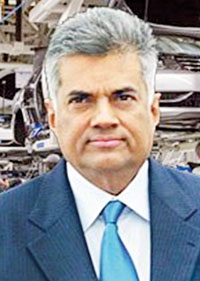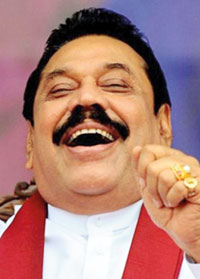Columns
Mahinda’s shot in the dark to topple government this year
View(s):Coups, even bloodless ones, to topple people elected popular governments are generally planned under cover of darkness and executed with lightning speed to take all by surprise to ensure its success.
But not so, it seems, for former president Mahinda Rajapaksa. When he fancies overthrowing regimes, he gives one year’s notice and trumpets his intended bravado from the front pages of the world press.
Last Thursday in an interview with the Colombo-based foreign correspondents, he delivered his own New Year message to the Lankan people whilst tucking into the now symbolic crusty hopper. He declared: “I will topple the government in 2017. When I said I would defeat Prabhakaran I did it. I have the same confidence.”
 But what right does Mahinda Rajapaksa think he has to topple this year a government elected by the people not even one year and five months ago? Does he still suffer the belief that he has some sort of god given right to rule this country in perpetuity? And consider it but a quirk of fate that anyone else should assume the purple and rule the nation in his stead? Which glitch would soon be set right when the stars align to restore the old order and elevate him once again to the old familiar throne, crown and sceptre?
But what right does Mahinda Rajapaksa think he has to topple this year a government elected by the people not even one year and five months ago? Does he still suffer the belief that he has some sort of god given right to rule this country in perpetuity? And consider it but a quirk of fate that anyone else should assume the purple and rule the nation in his stead? Which glitch would soon be set right when the stars align to restore the old order and elevate him once again to the old familiar throne, crown and sceptre?
Exactly two years ago on this day, the Lankan people elected Maithripala Sirisena as the executive president of this country; and gave him a clear mandate to steer the affairs of this nation undisturbed for the next five years. They also placed upon him the bounden duty to keep the promises he made prior to his election, specifically to restore just governance, to dramatically reduce executive powers of the presidency or abolish it altogether, to crackdown on the mega corruption of the previous regime, and to work for the benefit of the masses. He will be judged at the end of his term when the people once again receive the voting right to throw him out or keep him in for another five years in office.
But hardly had he formed his government made of both the SLFP and the UNP and appointed Ranil Wickremesinghe as the new prime minister – both moves announced well in advance during the campaign and in his manifesto – and barely had the chance to sip his goblet of triumph and get down to work for the nation’s welfare, the defeated forces, unable to stomach losing their powers and their pampered status, deprived of increasing their billions even more by the plunder of the national coffers and fearing they would lose it all, including their own liberty, with the promised crackdown on corruption, peeped from the debris of their debacle and set about to cripple the newly elected president; and sabotage at every turn the nation’s onward march to a new dawn that promised both prosperity and good governance.
The nation had showed Mahinda Rajapaksa the door in no uncertain terms but it was clear he did not intend to remain on the outside in the cold. Though he professed in public that he respected the people’s verdict and would retire to his home Medamulana, the gathered leaves of his actions served to reveal his true intent. From the megaphones of political catchers, blared their master’s voice: Mahinda Rajapaksa was still President — if not in law, then in fact.

PRESIDENT SIRISENA: Someone is dreaming dreams
The message they put forward then, in that February of 2015, not even five weeks after Sirisena had been elected by the people as president, in an election that was considered by all parties as one held free and fair, was that Rajapaksa was the truly elected president of Sri Lanka because the majority of the Sinhalese had voted for him. For them the land belonged to the Sinhalese, and if the Tamil and Muslims considered themselves as citizens, they were only second class and their votes did not count when it came to electing the president. The majority will ruled. And from that warped reasoning, the battle cry arose on a Nugegoda stage on February 18th 2015, “Bring back Mahinda.”
It was a wail that was to resound at every meeting on the ‘Bring back Mahinda’ campaign trail which, at the approach of the general hustings, soon turned to a “Make Mahinda Prime Minister’ cry until the 17th of August in 2015 when the general elections were held and it became clear that the pathetic refrain had fallen flat on the ears of the general public. As district after district fell under the UNP spell, it was apparent that the people had given the cold shoulder to the old war-won king whose magic had vanished into thin air.
Rajapaksa, who having scored a first in becoming the first incumbent president to lose a presidential election, had notched another record: The ex-president had been demoted by the masses to be just a mere member of Parliament from the backwaters of Wayamba. He had stooped to conquer but had failed to transcend the fate the gods had ordained and the people had determined.
But that did not put a damper on his spirit to purse relentless his elusive dream. No man in recent times has made such a determined bid to regain what he had forfeited through abuse of power and squander of national wealth or banged his head against the walls of providence to relive enthralled the powers he had once enjoyed. If, in the recent course of Lanka’s political history, the lust for power lost can be personified, no doubt it will find its avatar embodied in the figure and frame of the former President Mahinda Rajapaksa.
No president has ever made such a determined, persistent effort to make any comeback whatsoever. President J. R. Jayewardene, with his sledgehammer five sixth majority in Parliament, could easily have extended the two term limit he set for presidents in his own self-made constitution but retired gracefully at the end of his two terms handing over the torch to Premadasa. D. B. Wijetunga, who was thrust into the presidency on Premadasa’s pre-mature death, seemed relieved to go and retired into oblivion when Chandrika Bandaranaike Kumaratunga was elected president.
And even the mercurial twice elected Chandrika, though she complained that she had been robbed of an extra year as president due to her taking oaths a year before her first term expired, retired hurt but had no intention to make a comeback in the 2015 election when the way was open for her to do so, since the two term bar had been scrapped by the 18th Amendment to the constitution by her successor Mahinda Rajapaksa in 2010 to make constitutional provision for him to contest the post not only for a third term in 2015 but in perpetuity.

PM RANIL: Party differences will be resolved
But one cannot begrudge a man his ambition nor deny him the right to take his own road to ruin. But when he tries, like a modern day pied piper of Hambantota, to drag the masses with him to the brink of the abyss, it becomes a cause for national concern. Ever since his ignominious defeat, Mahinda Rajapaksa, understandably, has never hidden his distaste for the present national government and for its leaders. By word and deed, by TV news clip and voice cut, by platform speech and the odd press statement, he has been frank enough to express the view that he will not be sorry to see the last of both Sirisena and Wickremesinghe. Fair enough.
But last week did he go a bridge too far when he declared to the foreign media that he intended to topple the government this year and stated that ‘today a politician need not be the president to rule the country?’
He may not have realised the gravity of the statement he made and its ominous import: that one ‘need not be the president to rule the country.’ For one to do so it would mean to usurp the powers of the president granted to him and him alone in the constitution; and to negate the sovereign right of the people’s right to choose their president and expect him and him alone to rule the nation using the powers so vested in him and him alone: not have them robbed by some marauding buccaneer, a thief of the people sovereign rights. Anyone who dares to do so would be guilty of acting outside the political and legal framework of the constitution.
But if that be his intention, what’s his strategy? And does he have the fire power to make good his sinister threat to topple the government and rule this year?
The strategy, of course seems to be simple enough to be almost childlike in wishful thinking or as common as day dreaming in senility. His plan is to topple the government democratically and, as he hinted last week, it is by becoming prime minister of a UPFA government. When journalists asked him whether he was prepared to serve as prime minister under Sirisena’s presidency, his reply was that, “if Ranil can do so then why can’t I? After all I have known Sirisena for so long since 1970.”

MAHINDA: I will topple the government this year
This line of thinking was further endorsed by one of his chief side-kicks, the former Western Province chief minister Prasanna Ranatunga who stated this week that “Mahinda Rajapaksa does not have to wait a year to topple the government; he can do so overnight by becoming the prime minister of an SLFP government.”
But obviously Mahinda Rajapaksa is not that naive to believe it to be so simple. As things stand at present, if Sirisena were to appoint him as prime minister sacking Ranil in the process to make way, no single Government bill will be passed in Parliament since the UNP, with the rest of the opposition parties can and will defeat it. It will only be a pyrrhic victory for Rajapaksa if he was to win the premiership now. Overnight he will have to resign as prime minister the moment he fails to get his bills passed and the loss of face he will suffer as a result may possibly make it impossible for him to show up again in the chamber. Nay, the strategy Rajapaksa has in mind is a long term one, which will probably take a year to mature and succeed. Or at least that’s what he thinks.
But what will it achieve? What good will come of it for the people?
The economic policies of the two regimes are hardly any different. The only difference is ‘just governance’. During these two years of Sirisena rule, the people have seen the introduction of the 19th Amendment which strengthened civil liberties and brought in constitutional councils and made nine commissions independent, including the police, the bribery, the auditor general and the elections commissioner. Furthermore the citizenry now have a legal Right to Information. Even with difficulty and hiccups, the present Sirisena-Wickremesinghe government is striving to achieve just governance whereas for the past Rajapaksa regime the concept of just governance only meant granting immunity to their own families, friends and cronies to pursue their corruption unlimited without fear of prosecution.
But never mind whether he will topple the government this year. That may never happen. What Rajapaksa has succeeded doing, however, is to further plunge this country into a state of terminal instability: the greatest turn off for foreign investors upon whom the government has nailed its faith to make Lanka’s economic sun shine. What a tragedy it is indeed for Lanka, that one man’s pathological lust for power should damn a whole nation to the ghetto.
| The Eight Labours of Rajapaksa, to ‘rule without being president’ So what are the Eight Labours of Rajapaksa that he will have to do successfully before he can draw out the Sword of Excalibur from the unyielding stone to become Lanka’s imposter king who, while pretending to be merely the prime minister, rules as president? THE FIRST He would have also heard President Sirisena declare on Thursday — for good measure — “that dreams to topple the government would remain as mere dreams, and that there would be no room to change the present administration.” He would have taken note of Sirisena’s words “Someone is trying to topple the government. We will not let anyone change the government illegally or by violating the Constitution.” Yes, he will think, if the leaders wise up to his machinations and resolve their differences, it will be kaput for his plan to topple the government. Bu that, he knew, will only make him more determined to engineer the split. THE SECOND THE THIRD THE FOURTH THE FIFTH THE SIXTH THE SEVENTH What a pity, he will think, that both the Tamils and the Muslims regarded him as a racist and a religious bigot. He will now realise that perhaps the support of all communities were necessary to gain the presidency. How wrong his advisers had been. THE EIGHTH At that time in 2007 he had been able to pull 18 MPs from the UNP, the same amount he needed now to have a majority. Then it had been done to give him not a simple majority – he already had it – but to give him a two-thirds majority to amend the Constitution and bring in the 18th Amendment which allowed him to contest for life after the second term ended. The UNP MPS then were demoralised. They could look forward only to a life of drought while they saw with envy the happy pastures on the government side. It had been child’s play to steal them under the nose of Ranil. He simply couldn’t stop the exodus. But today it is different. The roles had changed. Today Ranil is not only once-bitten-twice-shy but he is in a commanding position and even his MPs know it is far better to stick fast to home ground than spread wings and fly to uncertain bourns. Perhaps a few, with the right inducements, may turn Judas but, alas, who can tell which way the weather cock may turn except that it turns whichever way the winds blow. And would they turn out to be homing pigeons? Even if Rajapaksa succeeds in doing all this and more, then what? Would President Sirisena watch askance while all this is happening? Will he let Rajapaksa use his powers to act as the de facto president while he remains, like a mascot in a military parade, fit for only ceremonial occasions? Will Sirisena willingly commit political suicide and be content to play second fiddle, be a pathetic puppet dangling in the hands of a man who has never forgotten that he was betrayed over a hopper diet on his birthday? And whilst all this usurpation of the public will is taking place, will the people merely watch and clap? Can a parliamentary coup staged in sterile air have a chance of lasting success? These are the factors that Mahinda Rajapaksa must take into account before he starts to bite more than he can chew. And realise that, unlike killing Prabhakaran and winning the Eelam war, toppling a democratically elected government in midterm is quite a different ball game.
|


Leave a Reply
Post Comment